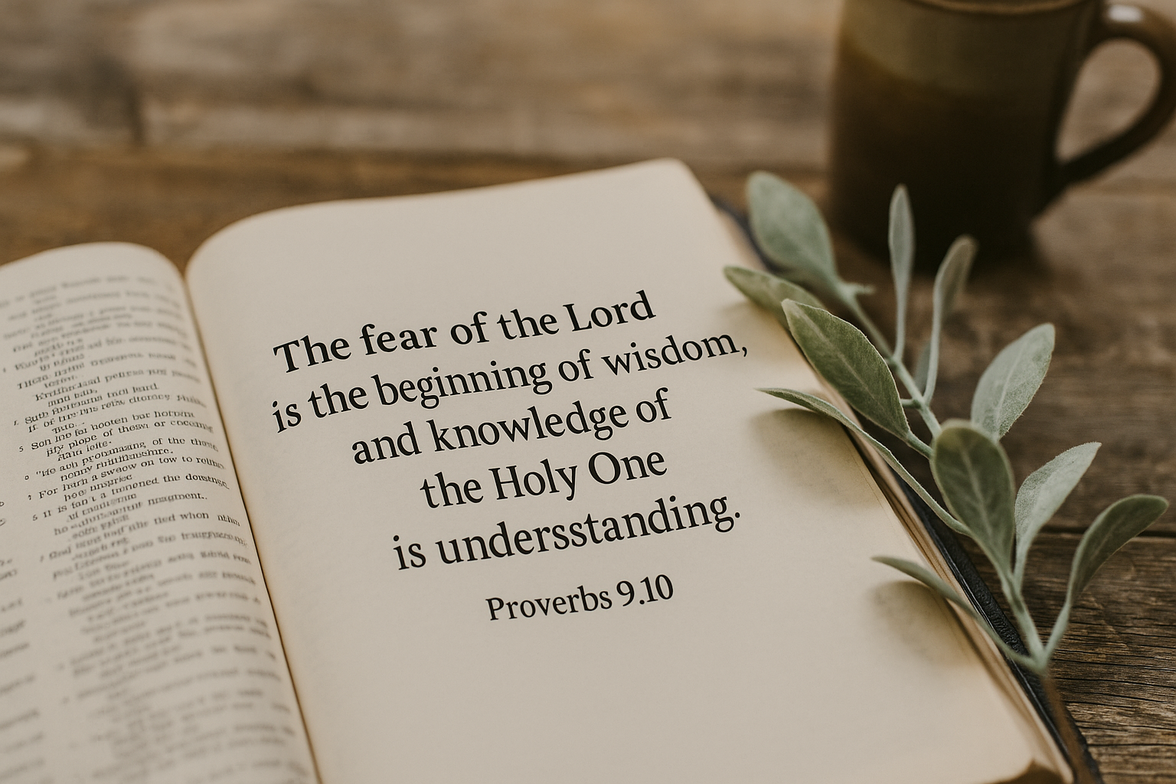Let’s slow down and unpack what that actually means, revealing how this ancient concept is a practical starting point for true wisdom and a more stable life.
1. The "Fear" We Need Isn't Terror, It's Awe
When the Bible says "fear the Lord," does it mean we’re supposed to be scared of God?
The short answer is no—not scared, but in awe.
Let’s go deeper. The Hebrew word often used is yirah, which means awe, reverence, and deep respect. It’s the difference between being terrified of someone who wants to hurt you versus being overwhelmed by someone’s greatness and goodness.
Here’s a picture: Imagine standing on the edge of the Grand Canyon. You aren't afraid it will hurt you, but you are humbled, aware, and you don't play games with the edge. You feel small, but in a good way. That sense of “Whoa… this is bigger than me” is awe. That’s the fear of the Lord.
It’s living every day with an awareness that:
• God is holy.
• God sees all.
• God knows better.
• God loves me.
• God has the final word.
“It’s realizing: ‘God is God… and I’m not.’ And that moment — the moment you stop trying to run your own life like you’re in charge — that’s where wisdom begins.”
2. This Awe Produces Stability, Not Anxiety
Shifting your perspective from terror to awe has tangible benefits. Fear of the Lord means having awe for God’s holiness, respect for His authority, and trust in His goodness. This posture produces profound security, not anxiety.
When we see God rightly, we start living rightly. Scripture shows us the tangible outcomes:
• It changes our behavior. We stop treating sin like it’s “no big deal.” We start caring about what pleases Him, turning from evil and doing good. (Psalm 34:11-14)
• It gives clarity and purpose. We understand that life isn’t random and our decisions matter, because God will bring every deed into judgment. (Ecclesiastes 12:13-14)
• It brings profound security. You don’t have to chase control, panic in every crisis, or try to be your own savior. He will be the stability of your times. (Isaiah 33:6)
This posture leads to a calmer, more stable inner life because you know who is ultimately in charge.
3. This Awe Changes How You Live
Let’s get super practical. This shift from seeing God as a threat to seeing Him with awe changes everything in real life.
• How I speak to people: When I fear the Lord, I remember every person is made in God’s image. Sarcasm and passive-aggressive jabs don’t feel funny anymore. Respect starts to replace harshness.
• How I work: When I fear the Lord, I stop asking, “Will my boss notice?” and start asking, “Would God be pleased with how I’m doing this?” Integrity begins to matter more than shortcuts.
• How I spend my time and money: When I fear the Lord, I stop saying, “It’s my money, my life,” and start saying, “I’m a steward. I answer to Someone.” Priorities shift from impulse to purpose.
• How I handle stress and conflict: When I fear the Lord, I don’t have to win every argument or control every outcome. Why? Because I know who’s actually in charge. Faith slowly replaces panic.
4. It's the Antidote to Our "I've Got This" Mentality
Most of our bad decisions start with a single, confident thought: "I know what I’m doing. I’ve got this."
The "fear of the Lord" is the direct opposite of this attitude. It is a posture of surrender. As Proverbs 3:7 says:
"Do not be wise in your own eyes; fear the Lord and turn away from evil."
There is a critical difference between simply functioning and walking in wisdom:
• Functioning: "I'll handle it."
• Wisdom: "Lord, guide me."
This surrender is not weakness, but alignment. It's the act of saying, "I don’t want to run ahead of You. I want to walk with You." It is at this precise point—the point of surrender—that wisdom is born.
A Simple Practice for This Week
Here’s something you can start doing immediately to train your heart to live aware of God.
Every morning this week, pray: “Lord, help me see this day through Your eyes.”
Then, during the day, watch for one moment where that prayer changes how you respond. It might be how you talk to someone, whether you lean into temptation or walk away, or whether you spiral into worry or hand it back to Him. Write that one moment down.
This awareness—that reverent, steady, humble awareness—is the fear of the Lord.
Conclusion
Wisdom doesn’t start with information. Wisdom starts with posture.
Ultimately, the "fear of the Lord" is not an emotion to be dreaded but a posture of awe and surrender that reorients our entire lives. It’s a quiet, steady awareness of who God is and who we are in relation to Him.
Here’s a line worth sitting with: When you truly fear the Lord, you stop chasing applause from people and start seeking approval from One Person — God.
That’s freedom.
Where in your life are you still trusting your own wisdom more than God’s?

